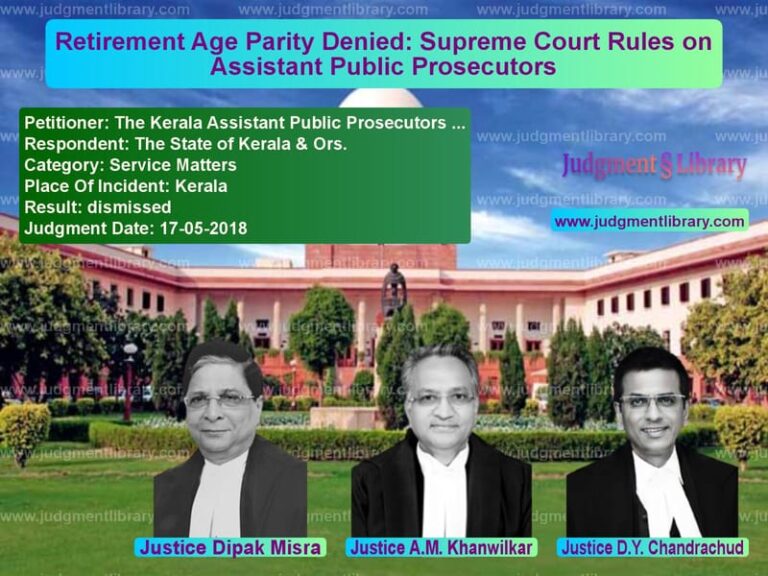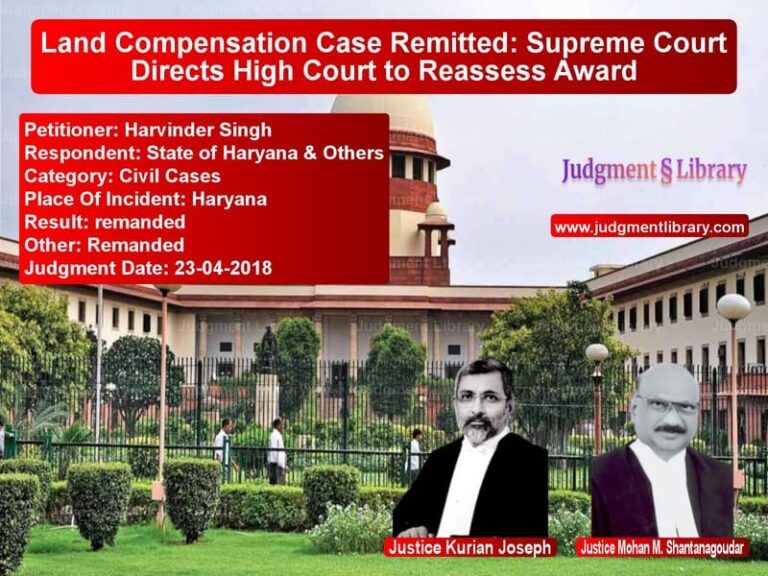Supreme Court Grants Bail in High-Value GST Evasion Case Against Tobacco Trader
The Supreme Court of India, in its judgment dated December 5, 2022, in the case of Ratnambar Kaushik vs. Union of India, granted bail to the petitioner, who was accused of evading Goods and Services Tax (GST) amounting to over ₹15 crore in connection with the transportation of raw unmanufactured tobacco. The Court ruled that the petitioner had been in custody for over four months, the investigation was complete, and the prosecution’s case was largely documentary, making his continued detention unnecessary.
Background of the Case
The case involved allegations of clandestine transportation of raw unmanufactured tobacco from Gujarat to Delhi, bypassing tax obligations under the Central Goods and Services Tax Act, 2017. The prosecution claimed that the petitioner was involved in the supply of unaccounted tobacco, leading to substantial revenue loss to the government.
The prosecution alleged that the petitioner transported 90,520 kg of unmanufactured tobacco using seven trucks, and additional transactions involving 287 trucks were identified through toll records. The estimated tax evasion was pegged at ₹15,57,28,345, including GST and cess.
The petitioner initially sought bail from the Rajasthan High Court, which was denied on October 21, 2022. Subsequently, he approached the Supreme Court, challenging the High Court’s order and seeking release on bail.
Arguments Presented
Petitioner’s (Ratnambar Kaushik) Arguments
The petitioner, represented by senior counsel, contended:
- The allegations of tax evasion were exaggerated, and the actual tax liability was significantly lower than ₹15 crore.
- The prosecution failed to prove that the unmanufactured tobacco was used to manufacture taxable chewing tobacco.
- The case was largely documentary in nature, and there was no need for his continued incarceration.
- He had already spent over four months in custody, and the trial was expected to take a considerable amount of time.
Respondent’s (Union of India) Arguments
The prosecution, represented by the Additional Solicitor General, argued:
- The petitioner was engaged in large-scale tax evasion, leading to a substantial revenue loss.
- Investigations revealed that apart from the seven trucks initially identified, 287 additional trucks were used for unaccounted transactions.
- Allowing bail at this stage could hamper further investigations into potential co-conspirators.
- The petitioner had access to financial resources and could potentially tamper with evidence if released.
Supreme Court’s Observations
The Supreme Court considered the nature of the allegations, the petitioner’s period of incarceration, and the nature of evidence involved in the case. The Court made the following key observations:
- “Even if the total tax evasion is considered to be ₹15 crore, the maximum punishment under Section 132(1)(l)(i) of the GST Act is imprisonment up to five years.”
- “The petitioner has already spent over four months in custody, and the trial is likely to take time.”
- “The evidence in the case is primarily documentary, and the risk of tampering is minimal as key financial records are already seized.”
- “Bail conditions can be imposed to ensure that the petitioner does not flee or interfere with the investigation.”
Judgment and Ruling
The Supreme Court ruled in favor of the petitioner and issued the following directions:
- The petitioner was granted bail, subject to conditions imposed by the trial court.
- The petitioner was required to deposit his passport with the trial court to prevent the risk of absconding.
- The petitioner was directed to appear before the trial court as and when required and fully cooperate with the trial proceedings.
- The prosecution was permitted to approach the court for cancellation of bail if any violation of conditions was found.
Implications of the Judgment
This ruling has significant implications for economic offenses and tax-related criminal proceedings:
- Judicial Approach to Bail in Economic Offenses: The judgment reaffirms that bail should not be denied solely on the basis of the quantum of alleged evasion.
- Consideration of Trial Timelines: Courts must consider the expected duration of trials when deciding bail applications in financial crime cases.
- Emphasis on Documentary Evidence: The ruling highlights that when cases are based on documentary evidence, prolonged detention may not be necessary.
Conclusion
The Supreme Court’s decision in Ratnambar Kaushik vs. Union of India underscores the principle that bail should not be denied as a punitive measure, especially when the accused has already spent a significant period in custody. By granting bail with strict conditions, the Court has struck a balance between ensuring the petitioner’s presence for trial and upholding his fundamental rights. This ruling serves as an important precedent for future economic offense cases.
Petitioner Name: Ratnambar Kaushik.Respondent Name: Union of India.Judgment By: Justice A.S. Bopanna, Justice Hima Kohli.Place Of Incident: Rajasthan.Judgment Date: 05-12-2022.
Don’t miss out on the full details! Download the complete judgment in PDF format below and gain valuable insights instantly!
Download Judgment: ratnambar-kaushik-vs-union-of-india-supreme-court-of-india-judgment-dated-05-12-2022.pdf
Directly Download Judgment: Directly download this Judgment
See all petitions in Tax Evasion Cases
See all petitions in GST Law
See all petitions in Banking Regulations
See all petitions in Judgment by A. S. Bopanna
See all petitions in Judgment by Hima Kohli
See all petitions in allowed
See all petitions in Stayed
See all petitions in supreme court of India judgments December 2022
See all petitions in 2022 judgments
See all posts in Taxation and Financial Cases Category
See all allowed petitions in Taxation and Financial Cases Category
See all Dismissed petitions in Taxation and Financial Cases Category
See all partially allowed petitions in Taxation and Financial Cases Category







